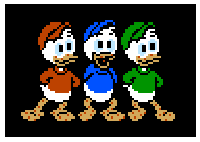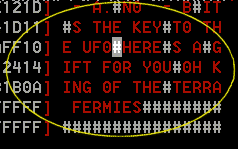The Story Behind the Game
|
In November of 2002, NES-loving junkie Skrybe somehow tracked
down one of the producers of Duck Tales, Darlene Waddington.
He did a mini-interview with her over e-mail, and then posted
her responses on Sardius' web board. Which was cool enough
as is, but then Ms. Waddington actually started posting there,
answering our questions on demand. She's like, too cool. Really.
The following is a series of excerpts from Ms. Waddington herself.
Eternal thanks goes out for all her help, for both working on the
game and then answering our nitpicky questions. Duck Tales wouldn't
have been the same without you! :)
|
On Disney and Video Games
"...I was a producer at Disney of many PC, Apple, C64 and NES games. I
can't recall any really great NES stories from those times, mainly because
development went so incredibly (and unusually) smoothly. Capcom was an
excellent licensee developer. They mainly came up with the ideas for the
game mechanics, and I was there to keep the games on-track, Disney-wise.
I provided them with line art for the characters and sometimes for the
settings; I cleaned up the dialogue and made sure the characters didn't
commit any un-Disneyesque acts of violence, and I game tested a lot to
make sure the games were challenging, fun, and bug-free.
"How the characters behaved was an issue that all the producers at Disney
had to keep a close eye on. In one game, the Japanese licensee had added an
arcade that had Donald Duck clubbing baby seals! In another, Donald was
getting electrocuted in the tub just for laughs [Donald's Alphabet Chase for PC, developed by Westwood Associates]. Developers would be
crushed when you had to tell them that these elements couldn't stay in the
game. Consumers were very touchy about anything too violent in Disney games
-- in one pre-school game, Mickey opens an oven and flames roar out for a
moment before he slams it shut. Parents complained about that, saying that
it taught children to play with ovens. You had to walk a fine line to
create action that people wouldn't find objectionable.
"You also had to keep a close eye on how the Disney characters looked. Move
a pixel here and there, and Mickey winds up looking like some sort of
post-modern graffiti. Especially in the low-rez days, Mickey often wound up
turning into a glob. Fortunately all this became easier as computers became
more powerful. I had come to Disney from the laser-disc arcade industry, so
it was distressing to see how pitiful the graphics looked on a machine like
an Apple II."
On Duck Tales
"...I joined Disney and was given this project toward the tail end [of its development], and for the life of me I can't remember anyone really testing it other than me. There might have been one other tester, but I'm not sure. Disney Software was extremely small. I was the third producer, we didn't have assistants at first, and no formal QA or testing staff. We had slow computers with no hard drives, no e-mail, and eventually one modem to share. I believe Capcom was supposed to do the thorough testing on this game. Then, maybe about a year later we started to staff up and become more self-reliant."
"Those NES games were some of the most rewarding to work on because they
were well-received and fairly effortless to produce. Another producer named
David Mullich had started the Ducktales project and handed it off to me
when I came on board, so he deserves credit too. I won a nice award and
trophy for the Gameboy version of Ducktales -- it was Gameplayer's
Magazine's Gameboy Game of the Year. Now, if only all game development were
that easy!!!"
"...I never got much feedback from players of my games. The only ways I could gauge success was from the number of units sold and game mag reviews. If people talk to me about any game at all, it's Dragon's Lair. So it's really neat to know that this particular game had the kind of impact to make it a cherished childhood memory. I hope there are more people out there like you folks in this group!"
On Revisions and Censorship
"...I can't remember why the burgers were subbed for
the cones. As I recall, it was just some oddball reason... maybe it was
something like the cone sprites took up less memory or maybe some Disney
exec wanted something more vegetarian... whatever the case was, it probably
didn't actually make any sense!"
"...the crosses on the coffins had to go. Not just a Nintendo issue. I don't think any publisher would let that go back then. Don't know about now. Seems a little silly to me, but apparently this is the world we live in."
"I wish I could remember what was with those alternate Ducktales
segments. I kept a lot of my documentation from Disney, but nothing really
on the cartridge games. I had some of that stuff for a while, and then I
did a purge long ago because I had too many boxes of paperwork piling up. I
don't even remember the Terra Fermies part -- it may have been something
Capcom either cut before I came on, or it was something they toyed with and
cut on their own. I do remember having the option of Scrooge losing all his
money. Can't remember for sure why it was cut, but I *think* it somehow
seemed too un-Scrooge-like... too much of a loser scenario for Scrooge to
go bust. Again, this wasn't my decision -- just something someone else had
decided."
"I believe we made the ending quite easy because it seemed just too cruel to have the player acquire all the treasures and then leave him frustrated at the end with the switcheroo. I'm not sure why that "surprise" ending was needed to begin with, but it was already there when I came on."
"I remember really laughing at that original ending message from Scrooge. I was the one to dispense of that. Not sure why the music changed in some sections of the game... Capcom may have just decided to it on their own. I think the music was set when I joined the project."
"As I recall, sprucing up text was always a big hassle. Capcom didn't want to devote any precious resources to text, so you had to be extremely brief. It was also hard to convince them to bother with fixing puncuation because it was neither here nor there to them. That's actually an eternal struggle with virtually any software development because most programmers don't give a whit about spelling or punctuation, and they don't want to bother fixing it. When you're dealing with something like a Christmas release, you often have to grin and bear it and live with certain bugs. I think that's what happened with 'Huey, Louie, and Louie.' Some things on the 'to do' list wouldn't get done for God knows what reason, so you had to strategically insist on certain key bug fixes near the end rather than getting them all fixed. At least that's how it was back then."
Today, Darlene Waddington works as a script editor in translated Japanese
anime releases, including the revised scripts for Lupin III, which began to air
on Cartoon Network in January 2003. She also is the maintainer of the
Candy
Wrapper Museum. |




